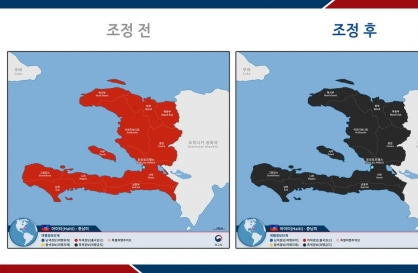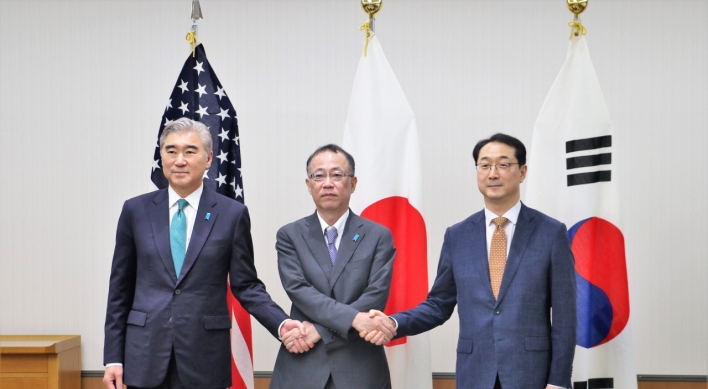The European Union and Korea are in talks to upgrade political and economic dialogue on managing crises around the world in a new agreement that could eventually see cooperation on military operations against piracy in the Indian Ocean.
It is the latest in a series of landmarks for Korea and Europe. In 2010, they officially elevated their relationship to a “strategic partnership,” the EU-Korea Free Trade Agreement entered into force in 2011 and two-way trade surpassed the $100 billion mark last year.
Not bad, considering much of the world ― including most of Europe ― was in recession last year.
Europe celebrates the regional government’s founding on May 9, called Europe Day, in commemoration of the Schuman Declaration of May 9, 1950. This year Korea and the EU celebrate the 50th anniversary of the establishment of diplomatic ties.
It is the latest in a series of landmarks for Korea and Europe. In 2010, they officially elevated their relationship to a “strategic partnership,” the EU-Korea Free Trade Agreement entered into force in 2011 and two-way trade surpassed the $100 billion mark last year.
Not bad, considering much of the world ― including most of Europe ― was in recession last year.
Europe celebrates the regional government’s founding on May 9, called Europe Day, in commemoration of the Schuman Declaration of May 9, 1950. This year Korea and the EU celebrate the 50th anniversary of the establishment of diplomatic ties.

“We are negotiating a new agreement called ‘the framework agreement on crisis management.’ Korea could be the first Asian country with which the European Union signs such an agreement,” said European Union Ambassador to Korea Tomasz Kozlowski in an interview with The Korea Herald at his office in downtown Seoul on Tuesday.
The new EU-Korean partnership developed as European foreign policy reached a whole new level. In 2010, after the Lisbon Treaty came into force, Europe established its External Action Services and the EU’s foreign ministry, and appointed Catherine Ashton as its first EU foreign minister.
This includes EU-led police and military operations which it has increased over the last 10 years. Europe has about 30 operations in Europe, Africa and Asia, including Operation Atalanta in Somalia, its Eucap-Nestor operation in the Horn of Africa and training the Malian Army.
Europe and Korea could reach a final agreement on crisis management by the end of this year. Increased coordination on political and security issues is a first step toward possible Korean involvement in European military and security operations in the future.
“We could participate with Europe in those crisis management issues, like anti-piracy operations, training the Somali coast guard and counter-terrorism,” said Johanna Park, second secretary at the West Europe Division of the Ministry of Foreign Affairs.
The types and locations of European operations vary widely. They include a police mission in Kosovo, monitoring and weapons decommissioning in Aceh in Indonesia, deploying warships against pirates in the Indian Ocean and helping reform Georgia’s legal system.
Korean diplomats at the ministry confirmed that, moving forward, Korea could take part in “all kinds of security issues.” First, however, they must lay down a mechanism for political and security dialogue and a legal framework on crisis management.
These European-led missions were impossible little more than a decade ago. It was not until the establishment of Europe’s so-called common foreign and security policy in 1999 that developments to this aim were made.
“When the crisis in the Balkans occurred in the 1990s, the European Union could not react in any way beyond political statements. We did not have these instruments. Stage by stage we developed them. Now we are able to deploy different types of missions throughout the world,” he said.
The career diplomat, with more than 10 years of experience focused on Asian issues, said Europe’s close ties with China, for example, were instrumental in progress on negotiations with Iran in Almaty, Kazakhstan, on its nuclear program.
Europe looks for partners around the world to help it weigh into global issues like climate change and cyber-security and regional hot spots like the Korean Peninsula.
“The EU recognized Korea as a growing economic and political player. We decided to cooperate with Korea while looking for solutions for regional and global issues,” Kozlowski said.
Other European “strategic partners” in Asia include Japan and India.
“(The European-Korean) strategic partnership is more than a purely political declaration. The EU has only 10 countries around the world with this level of relationship,” Kozlowski said.
“Over the last two years, we established high-level political dialogue to discuss only such issues and at a lower, expert-level (established) dialogue on development cooperation, the Middle East and North Africa, cyber security and human rights,” he said. “We consult with each other on regional and international issues and look for solutions.”
Europe projects a more confident foreign policy than ever before. It is increasingly outspoken about North Korea, too.
In 2001, the EU and North Korea established diplomatic relations and European countries opened diplomatic missions in North Korea through the 2000s. Now, seven European countries have embassies in Pyongyang, including Germany and Great Britain.
Europe extends humanitarian and development assistance to North Korea. It gives about $13 million in food security assistance annually and disbursed an additional $13 million in humanitarian relief in 2011 through a number of European NGOs working in North Korea.
But Kozlowski was keen to emphasize that Europe is also critical of North Korea, describing Europe’s approach as “critical engagement,” and was categorical about North Korean nuclear ambitions.
“According to the NPT and U.N. Security Council resolutions, North Korea has never been recognized and will never be recognized as a nuclear power. This is a question of the nonproliferation policy,” he said.
“North Korea will never be recognized as a nuclear power.”
For the first time ever, the United Nations Human Rights Council voted to set up an inquiry to investigate rights abuses in North Korea. The resolution, proposed by the European Union and Japan, was unanimously approved in March.
“Our message to the DPRK (North Korea) has always been very clear. We are ready to expand our relations with DPRK, but we need to see some progress in three fields: denuclearization, human rights and inter-Korean relations,” Koslowski said.
By Philip Iglauer (ephilip2011@heraldcorp.com)
-
Articles by Korea Herald











![[New faces of Assembly] Architect behind ‘audacious initiative’ believes in denuclearized North Korea](http://res.heraldm.com/phpwas/restmb_idxmake.php?idx=644&simg=/content/image/2024/05/01/20240501050627_0.jpg&u=20240501225745)







